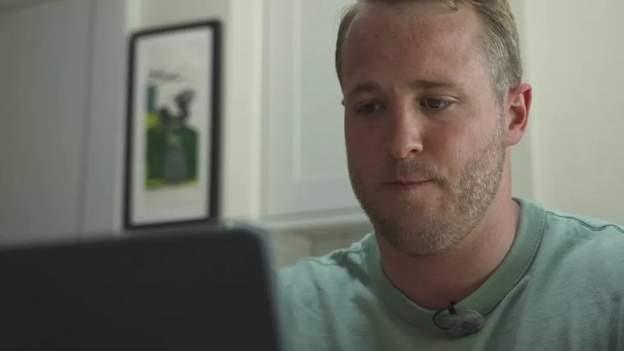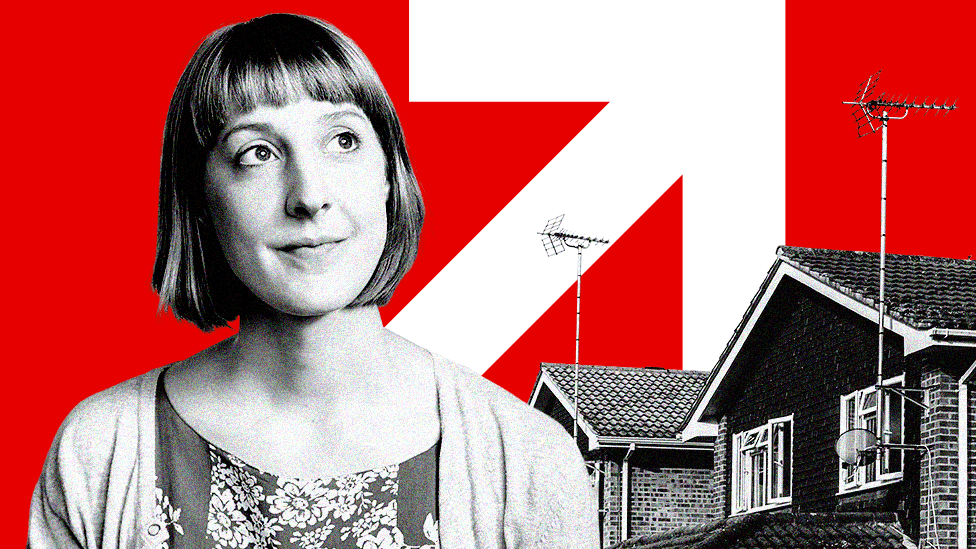Interest rates: Bank of England boss denies wanting recession as rates rise
- Published
- comments

The Bank of England boss has denied trying to create an economic slump after it put up interest rates by more than expected to slow soaring prices.
The Bank raised rates to 5% from 4.5%, the highest level for 15 years. Many analysts had expected a smaller rise.
It will lead to higher repayments for people with loans and many mortgage holders, but it should benefit savers.
Bank governor Andrew Bailey said that if it did not raise rates now, "it could be worse later".
"I understand the difficulty and the pain that causes for many people," he added of the shock interest rate decision.
On Wednesday, Karen Ward, a member of chancellor Jeremy Hunt's economic advisory council, said the Bank had "been too hesitant" in its interest rate rises so far and called on it to "create a recession" to curb soaring prices.
She told the BBC that if companies felt "nervous" because of higher interest rates, they would be less likely to put up prices. Employees would also be less inclined to ask for pay rises - another driver of inflation.
However, Mr Bailey said the Bank was not "trying to precipitate a recession".
"Many people with mortgages or loans will be understandably worried about what this means for them... but inflation is still too high and we've got to deal with it," he added.
He added that to get inflation lower, wage rises "cannot continue" at the rate they have been.
Mortgage rates have soared over the last year and a half as interest rates have gone up:
The average two-year fixed residential mortgage now stands at 6.19% while the five-year rate is 5.82%. In June last year, those rates were closer to 3%.
Those on a typical tracker mortgage will pay about £47 more a month. Those on standard variable rate (SVR) mortgages face a £30 jump
Since December 2021, that is an increase in monthly repayments of £465 on a tracker and £297 on an SVR.
Borrowing costs are also likely to rise. Currently the average annual interest rate, external is 21.86% on bank overdrafts and 20.13% on credit cards.
The dramatic move comes as the Bank tries to show it is in control of inflation, the annual rate at which prices go up, which was much higher than expected in May and far above levels seen in other countries.

Prime Minister Rishi Sunak is also under pressure to tackle the problem, having vowed to halve inflation by the end of the year.
On Thursday he said the job "has got harder" but added he was "totally 100% on it".
"Rooting out inflation is not easy. It requires difficult decisions," he said.
He added people's weekly shop had "gone up far too much" and the government would make sure supermarkets behaved "responsibly and fairly".
In a letter to Mr Bailey, Chancellor Jeremy Hunt said he would meet regulators next week, external to discuss how it can make sure falls in wholesale costs are passed onto customers. It comes after supermarkets have been accused of making too much money from rising food prices.
However, they have denied profiteering, with the British Retail Consortium saying stores are working to keep prices "as low as possible".
Shadow chancellor Rachel Reeves said families would be "desperately worried about what today's interest rate rise might mean for them".
'I have to find £400 more each month'

Ewan Cameron bought a flat in London two years ago and has just managed to secure a new fixed-rate mortgage deal, but not before he had two mortgage offers pulled.
He has now got to find an extra £400 a month to pay for his home, and is considering renting out the spare room to help pay for it.
In theory raising interest rates makes it more expensive to borrow money, meaning people have less to spend. This makes it harder for firms to raise prices.
However, the process also drags on the UK economy, which is struggling to grow. Higher rates are also forcing mortgage lenders - who are affected by the Bank's decisions - to put up their own rates.
Matt Smith, a mortgage expert at property portal Rightmove, said the rate rise would not be "much of a shock" to lenders.
He said the Bank had opted for a large hike in part to reassure the financial markets - though it remained to be seen whether it would work.
"If today's news does provide some reassurance, then we'd hope to see some stability return to the mortgage market which will help those looking to take out a mortgage this year to plan ahead," he said.
There have been calls for the government to step in and help homeowners, but Mr Hunt and Mr Sunak have so far dismissed suggestions that ministers could intervene.
However, Mr Hunt is set to meet with banks on Friday as pleas grow for more to be done.
Labour has also said it would not intervene. But it has said the government should force banks to help homeowners struggling with mortgage payments, for instance by allowing them to switch to interest-only payments for a temporary period.
Consumer champion Martin Lewis has warned "a mortgage ticking time bomb is now exploding".
The Bank's Monetary Policy Committee (MPC), which sets UK rates, voted 7-2 in favour of a half percentage point rise - its biggest hike since February.
Two members of the committee voted to keep rates on hold.
In a letter to Mr Hunt, Mr Bailey said that overall inflation was still set to fall "significantly" during the course of the year as energy prices come down.
But he added that the Bank would continue to monitor inflation closely, and would raise rates further if necessary.
Interest rates remain the Bank's primary tool to lower inflation, despite debate over their effectiveness.
The Bank said it was "continuing to monitor closely the impact" of the significant increase in the Bank rate so far.
It added that given the number of people yet to come off fixed-rate mortgage deals, the full effect of recent rate rises would "not be felt for some time".

What do I do if I can't afford to pay my debts?
It is important that you do talk about financial difficulties before finding yourself in a spiral of debt. The earlier, the better.
If you think you cannot pay your debts or are finding dealing with them overwhelming, seek support straight away. You are not alone and there is help available.
A trained debt adviser can talk you through the options available.

Related topics
- Published8 January 2024

- Published23 June 2023

